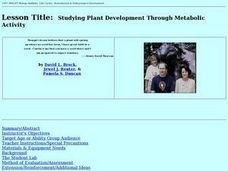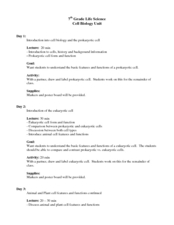Nuffield Foundation
Microscale Investigations of Catalase Activity in Plant Extracts
Use indirect measurements to monitor metabolic activity in plant cells. Scholars understand that cells with a higher metabolic rate have a higher concentration of catalase enzyme. They use this information to compare metabolic rates of...
Serendip
Understanding the Biology of Cancer
After initial exposure to a carcinogen, a cancer diagnosis often takes more than a decade due to the slow buildup of mutated cells in the body. Scholars learn about the biology of cancer with a worksheet and discussion questions. They...
Virginia Department of Education
Genetic Variation and Mutations
Young scientists demonstrate their creativity while completing several activities, to assess genetic variations and mutations. Instructors provide a list of options and scientists choose to write a comic strip, create a book,...
Curated OER
Studying Plant Development Through Metabolic Activity
A hands-on activity which allows young scholars to learn about cellular respiration. This lesson contains a range of investigations testing the rates of cellular respiration to demonstrate the relationship between metabolic rates of...
Curated OER
Biology: Understanding Cellular Organelles
Students distinguish the differences between Prokaryotic and Eukaryotic cells. Using microscopes, they examine a variety of plant and animal cells. Working in groups, they draw and label plant and animal cells and show the mathematical...
Curated OER
Why Muscle Biology?
Students research and define a muscle biology research question and organize an experiment to address the question utilizing either NADH staining or acid buffering. They analyze data as well as draw conclusions about their research....
Curated OER
Got Gas? How Much?
Students perform an experiment that measures respiration. In this performing an experiment that measures respiration lesson, students discuss aerobic and anaerobic respiration. Students measure the gas produced by putting...
Virginia Department of Education
Cell Parts
What do a bird, an egg, a rabbit, and a toad all have in common? This fun-filled resource explains the similarities and differences between cells and how all cells are similar, yet all are different. Learners begin by depicting a...
Virginia Department of Education
The Cell Cycle and Mitosis
What a packed lesson! Provide your class with the opportunity to learn about the cell cycle in several exciting ways. Biologists first learn about the theory behind mitosis, then proceed to view onion tips under the microscope and create...
Virginia Department of Education
Prokaryotes
Lead your biology class on a cell-sized adventure! Emerging scientists construct models of prokaryotes, then design an experiment to properly grow a bacterial culture. They conclude the activity by viewing the culture under a microscope....
Virginia Department of Education
DNA Structure, Nucleic Acids, and Proteins
What is in that double helix? Explain intricate concepts with a variety of creative activities in a instructional activity that incorporates multiple steps to cover DNA structure, nucleic acids, and proteins. Pupils explore the history...
Curated OER
Cell (Biology)
High schoolers conduct a series of activities to explore the nature of cells. In this biology lesson, students observe plant and animal cells under the microscope and compare them. They differentiate osmosis and diffusion.
Curated OER
Strawberry Smoothies
Biologists extract the DNA from a strawberry. After completing the procedure, learners write answers to a few questions on the lab sheet provided. This is ideal lab practice during a DNA unit in your general biology course.
Curated OER
Investigating Factors That Affect Cell Membrane Permeability
Cell membranes and the factors that affect its integrity are studied, with Beet tissue used as the model. A poster to display findings of the permeability of the membranes would clarify understanding and also allow a layer of language...
Serendip
Using Molecular and Evolutionary Biology to Understand HIV/AIDS and Treatment
HIV mutates rapidly, making treatments challenging to find. Scholars learn about why it mutates so quickly and how scientists race to find treatments. The resource approaches the issue from both a molecular and evolutionary perspective...
Virginia Department of Education
The Ratio of Surface Area to Volume
Demonstrate the ratio of surface area to volume in your high school class by using phenolphthalein, gelatin, and an onion. Intrigue the class by leading a discussion on osmosis and diffusion, then making "scientific jello." Participants...
Virginia Department of Education
Biotechnological Issues and Bioethics
Culminate a bioethics unit with the implementation of a activity that incorporates the Socratic method to encourage class feedback and participation. Pupils participate in a discussion on bioethics and morality, complete a...
Curated OER
Photosynthesis and Cellular Respiration
In this energy worksheet, students review the processes that create energy for a cell: photosynthesis and cellular respiration. This worksheet has 11 fill in the blank and 14 short answer questions.
Curated OER
Biology - Life Cycles Game
High schoolers develop a working vocabulary of terms related to the life cycle. In small groups, students play the life cycle's game which consists of matching and defining vocabulary. Directions for creating the game board are...
Curated OER
Glucose
Students conduct various experiments on glucose. In this biology lesson, students differentiate the process of diffusion and osmosis. They test different foods for the presence of glucose and starch.
Virginia Department of Education
Meiosis
Intrigue the class by completing a lesson on meiosis, filled with challenging and insightful activities to spark the interest of every person in the room. Each member of the class learns about genetic disorders due to faulty meiosis, and...
Curated OER
Technology-Lesson 2-Resolving Issues
Students define resolution. They explain the relationship between probe size and resolution and explain why information in three dimensions is necessary to describe the structure of an object. Research technology to the study of Cellular...
Curated OER
Photosynthesis
Students conduct a variety of experiments on photosynthesis. In this biology lesson, students identify the factors required for the process to occur. They perform computerized experiments to test the amount of oxygen produced when plants...
Curated OER
Plant Hormones
Students identify different plant hormones and explain their function in plant development. In this biology lesson, students investigate how IAA affect root growth. They study the history of auxin discovery.























